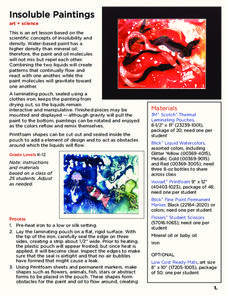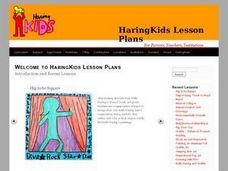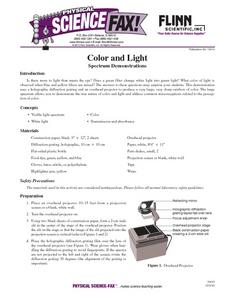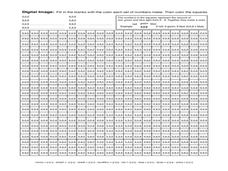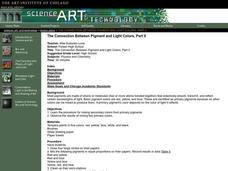Curated OER
Color
An interesting set of details about the light spectrum, these slides explain how objects reflect and absorb light to affect how they appear to the human eye. The differences in mixing lights or pigments is explained and some everyday...
Curated OER
Feeling the Heat
Pupils record temperatures at different locations around campus. They examine the results and draw conclusions about how materials and colors affect the amount of heat produced. They also analyze Los Angeles' temperature records over a...
Curated OER
Insoluble Paintings
Use this art lesson to study insolubility and density. Combining water-based paint and mineral oil will cause a fun and interactive painting. This is a great art project to incorporate during a science unit.
Curated OER
Papier-Mâché Globe
Paper mache projects are great for using up paper from the recycle bin. Give your class the chance to create a three-dimensional globe out of paper mache. They'll work to make their globes as accurate as possible, adding proper colors...
Royal Society of Chemistry
Observing Chemical Changes—Microscale Chemistry
Want to add a wow factor to your current chemical changes lesson plan? Try a microscale experiment with colorful precipitates! Partnered learners conduct 10 single displacement reactions and record their observations.
Curated OER
The Science of Color and Light
Students listen to a story about colors and then conduct various experiments to determine how people see colors, identify which colors stand out best from a distance, show the results of mixed colored lighting and explain the phenomenon...
Curated OER
Mixing Up Magic
Students explore the relationship between art and science through experimenting with color, design and recycled materials and creating their own art work.
Curated OER
The Color of Your Own
Students understand primary and secondary colors. In this lesson about colors, students explore where colors come from. Students paint a picture with the primary paint colors that the teacher has created. Students mix the primary paint...
Curated OER
The Color of Light
Students explore the components of light as a combination of several colors. The focus of the lesson reveals that objects are viewed in a certain color because that color is reflected off of the object.
Curated OER
What is It? Susie Sees!
Students explore the five senses. In this cross curriculum five senses lesson, students view an "I Can See Colors" PowerPoint presentation and sort items by color and shape. Students mix primary color paints to create secondary...
Curated OER
Color and Light Spectrum Demonstrations
Students explore the light spectrum. The teacher uses holographic diffraction grafting film on an overhead to demonstrate the true nature of color. After observing a vivid rainbow, students recognize that white light is composed of all...
Curated OER
Let There Be Light
Young scholars explore the relationship between light and color. They explore the NineColours computer program, blend colors, create a slideshow of hues of colors, and conduct an experiment using a flashlight and colored cellophane.
Exploratorium
Pixels, Pictures, and Phones
Take a real close look at your phone screen. What do you see? Here's an activity that provides guidance on how to look at a smart phone screen in order to see the pixels and to see how the phone creates colors and motion on the...
Curated OER
Imagers: The Adventure of Echo the Bat Number to Pictures: How Satellite Images are Created
Students examine the three primary colors of light and design a numerical code to represent those colors. They tell how satellites use numbers to create satellite images after completing a number of experimental activities.
Curated OER
Melted Oceans Lesson Plan
Students use melted crayons to mix and blend into ocean in motion scenes. They choose colors that they see in ocean water, melt the crayons, and swirl the wax into designs on white construction paper. They finish the artwork by letting...
Captain Planet Foundation
Solar Cooking Race
Study heat transfer with activities that focus on how heat energy works. Using a solar cooker, ice cubes, and heat transfer bracelets, kids experiment and record what they find by keeping ice cubes cold and vegetables hot.
Curated OER
Octopus Legs
Students have oceans of fun transforming a wienie into an octopus they can eat! After counting, cutting halves and fourths, observing steam and the effects of heat, they mix colors as they create a yummy dipping sauce from mustard and...
Curated OER
The Connection Between Pigment and Light Colors
Students learn the procedure for mixing secondary colors from primary pigments and observe the results of mixing two primary colors.
Curated OER
Soft Sculpture Birds
Art can mimic life, and animals are always interesting subjects. Learners create large soft sculptures (stuffed) birds using paper, paint, and other basic collage materials. They view images of birds, and discuss bird traits and shapes....
Curated OER
Bubble-ology
Students observe the visible spectrum while observing light hitting the surface of bubbles. They blow large bubbles and observe how the colors change.
Exploratorium
Bubble Tray
Create jumbo bubbles and use them to teach about surface tension or interference, perfect for a physical science lesson on light or molecular attraction.
Curated OER
Properties of Color
Second graders explore the properties of primary color and investigate what happens when primary colors are mixed. They listen to the story The Crayon Box That Talked and list the colors. They experiment mixing primary colors and...
National Energy Education Development Project
Exploring Hybrid School Bus Technology
The color School Bus Yellow was created in 1939 because science had proven peripheral vision detects yellow 1.24 times faster than other colors. Young scientists explore modern school bus transportation options and then discuss the...
Curated OER
Stacking Water
Young scholars experiment with different salinities of water using straws and different colors of water. They collect and interpret data from the experiment.


